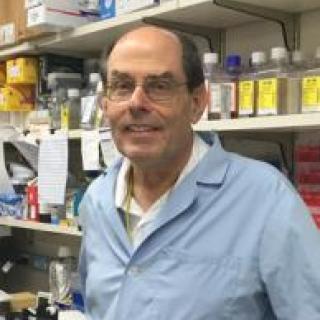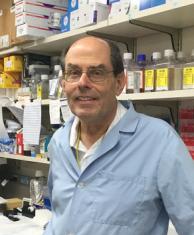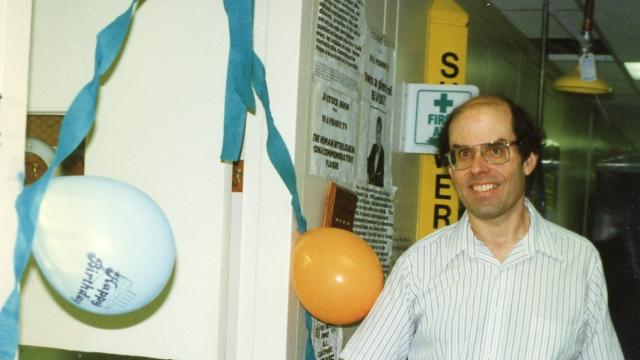
Howard A. Young, Ph.D.
- Center for Cancer Research
- National Cancer Institute
RESEARCH SUMMARY
Howard Young has expertise in the regulation and characterization of cytokine gene expression with a special emphasis on interferons. The Young laboratory's major focus was investigating how disruption of the control of interferon-γ (IFN-γ) gene expression during development and maturation of the cellular immune system impacts the host inflammatory response and the development of autoimmune disease and cancer. His laboratory developed a mouse model of chronic interferon-gamma expression that results in at least three different autoimmune diseases resembling lupus, ovarian failure syndrome and primary biliary cholangitis. In addition the male mice exhibit a heart function defect after exercise, This model may provide new insight into the initiation and progression of these diseases and offer novel approaches to treatment.
Areas of Expertise
Research
The laboratory studied the development and maturation of the cellular immune system in mediating antitumor and anti-inflammatory immune responses in the context of chronic inflammation. Our general goals were to use cellular and molecular approaches to investigate the consequences of persistent exposure to interferon-γ (IFN-γ) and how it alters host physiology. To approach this question, we generated a novel mouse model where a portion of the 3' untranslated region of the mRNA has been changed, resulting in a much more stable mRNA and this permitted us to understand the consequences of persistent IFN-γ expression on the host. We backcrossed this change onto the murine C57BL/6 and Balb/c genetic backgrounds and, as a consequence, developed new mouse models for lupus, primary biliary cholangitis, ovarian failure syndrome and aplastic anemia. In addition, we found that male mice may be more susceptible to developing myocarditis upon exercise. These mice are characterized by low but chronic IFN-γ expression. As a result there is persistent upregulation of IFN-γ inducible genes, resulting in the development of autoimmunity. Overall, our studies represented a cellular and molecular analysis of the consequences of aberrant regulation of cytokine gene expression in lymphoid cells and the effects on the host physiology and immune system development and function. Our studies provide a basis for developing a more complete understanding of the effects of IFN-γ expression during the pathogenesis of autoimmune diseases, cancer and infection and offer a model system for developing treatments to prevent or block disease progression.
Our collaborators included NCI investigators Dan McVicar, Clint Allen and David Wink. In addition we had collaborations with Dr. Eric Gershwin (UC-Davis), Dr. Anthony Filiano (Duke), and Dr. Guozhen Liu (Australia).
Publications
- Bibliography Link
- View Dr. Young's Complete Bibliography at NCBI.
Multi-omics: Differential expression of IFN-γ results in distinctive mechanistic features linking chronic inflammation, gut dysbiosis, and autoimmune diseases.
The interplay of type I and type II interferons in murine autoimmune cholangitis as a basis for sex-biased autoimmunity
Chronic expression of interferon-gamma leads to murine autoimmune cholangitis with a female predominance
Critical role of post-transcriptional regulation for IFN-γ in tumor-infiltrating T cells
IFN-gamma AU-rich element removal promotes chronic IFN-gamma expression and autoimmunity in mice
Biography

Howard A. Young, Ph.D.
Dr. Howard Young obtained his Ph.D. in microbiology at the University of Washington and carried out postdoctoral research at the NCI under Drs. Edward Scolnick and Wade Parks. He was a member of the Laboratory of Molecular Immunoregulation at NCI from 1983 to 1989 prior to joining the Laboratory of Experimental Immunology in 1989. He was President of the International Society for Interferon and Cytokine Research (2004-2005) and served as Chair of the Immunology Division of the American Society for Microbiology. He has also served as Chair of the NIH Cytokine Interest Group and Co-Chair and then Chair of the NIH Immunology Interest Group. He is a three-time recipient of the NIH Director's Award for Mentoring (2000, 2006, 2018) and in 2006 he received the National Public Service Award. He has also received the 2019 NCI Women's Scientist Mentoring Award and the ICIS Honorary Membership Award and Distinguished Service Award. He is also the inaugural recipient of the ICIS Mentoring Award. In 2024 the ICIS renamed the ICIS Distinguished Service Award as the ICIS Howard A. Young Distinguished Service Award. He has been elected to the American Academy of Microbiology and as an AAAS Fellow in 2022. He is a member of the International Cytokine and Interferon Society, the American Society for Microbiology, the American Association of Immunology and the AAAS. Dr. Young retired in January 2024 and is now an NIH Scientist Emeritus.
